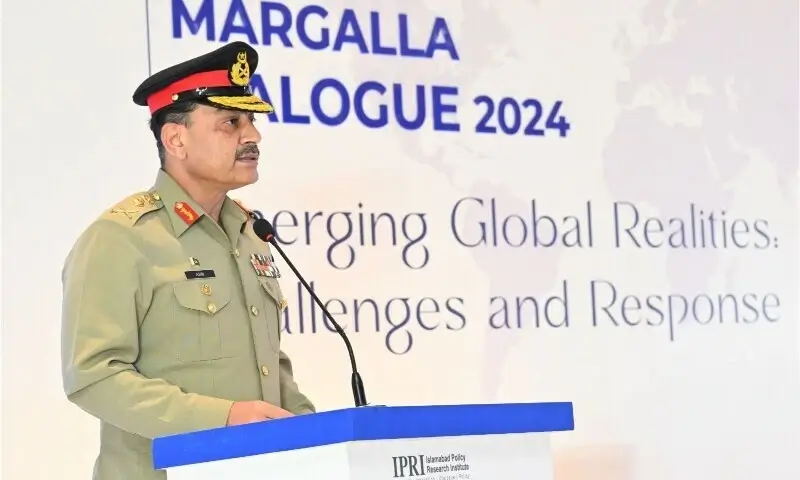In a powerful address at the Margalla Dialogue 2024 held in Islamabad, Chief of Army Staff (COAS) General Asim Munir expressed deep concerns about the dangers posed by unrestricted freedom of speech. He highlighted the role of unregulated online information in eroding societal values and called for comprehensive legal measures to curb the spread of misinformation.
Unrestricted Freedom of Speech and the Erosion of Moral Values
General Munir cautioned that while freedom of speech is a fundamental right, when left unrestricted, it can become a double-edged sword. The unchecked dissemination of information, especially through social media, has the potential to destabilize societies by spreading false and misleading narratives.
- The Role of Technology: Gen. Munir acknowledged the importance of technology in facilitating information sharing but noted that it has also enabled the spread of misinformation at an unprecedented scale. He stated, “The digital revolution has transformed how we receive knowledge, but it has also contributed to the degradation of moral values in all societies.”
- Legal Frameworks Needed: He emphasized the necessity of developing robust legal frameworks to counter the negative impacts of misinformation. “Without proper laws and regulations, false and misleading information, as well as hate speech, will continue to destabilize political and social structures,” the army chief warned.
The concerns raised by General Munir mirror the longstanding apprehensions within the Pakistani military regarding the harmful effects of online misinformation, particularly targeting state institutions and the armed forces.
Crackdown on “Digital Terrorism” and Misinformation
In recent years, the Pakistani government and military have intensified their efforts to combat what they term as “digital terrorism” — the spread of false information and propaganda against the state. The term has been used to describe actions by individuals and groups who utilize online platforms to disseminate content deemed harmful to national security.
Authorities have taken legal action and made high-profile arrests against journalists and social media users spreading “negative propaganda.” Pakistan has also imposed temporary bans on Twitter and Facebook to limit content deemed a threat to national security.
The military’s response has been a part of a broader strategy to maintain control over the narrative and ensure that state institutions are not undermined by what they perceive as disinformation campaigns.
Securing Borders Against Terrorist Threats
Beyond the issue of misinformation, General Munir addressed the ongoing challenges posed by violent non-state actors and cross-border terrorism. He underscored Pakistan’s unwavering commitment to combating terrorism and highlighted recent measures taken to secure the nation’s borders.
- Enhanced Border Management: Gen. Munir revealed that a more robust border management system has been implemented, particularly along the Afghanistan border, to counter the threat of the banned Tehrik-i-Taliban Pakistan (TTP), often referred to by the government as “Fitna al Khawarij.”
- Demand for Action from Afghanistan: The army chief reiterated Pakistan’s demand that Afghanistan deny safe havens to TTP militants and take decisive action against their leadership. He stressed that regional stability depends on collective efforts to root out terrorism.
Balancing Unrestricted Freedom of Speech with Security Concerns
General Munir’s remarks come amid rising political tensions and a renewed crackdown on military critics. While the government argues these measures are vital for national security, debates persist over balancing order with the right to free speech. Critics warn that restricting online expression and labeling dissent as “digital terrorism” could stifle free speech and political opposition. Pakistan faces the challenge of ensuring security without infringing on civil liberties.
- Tension Between Security and Rights: As the government enforces strict measures to protect national security, it faces increasing scrutiny over its approach to freedom of speech. Critics claim these actions could stifle public debate and dissent.
- Need for Reforms: There is a growing call for reforms that protect both national security and individual rights, particularly in the context of rapidly evolving digital platforms.
As the media landscape evolves and the reach of digital platforms expands, the debate over unrestricted freedom of speech and its implications for societal values and national stability will continue to be a critical issue for policymakers in Pakistan.

